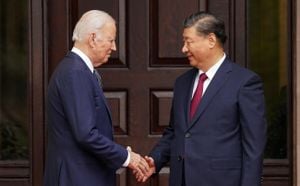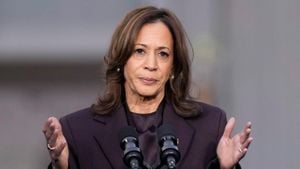Following the announcement of the newly formed Department of Government Efficiency (DOGE), skepticism and criticism have surged surrounding its unlikely leader, Elon Musk, and his ambitious goals to reshape the federal budget. Recently, Donald Trump revealed Musk's appointment alongside Vivek Ramaswamy, promising to cut federal spending by $2 trillion. This significant plan has raised eyebrows, including concern over how feasible it actually is.
Recently reported by The New York Times, Musk’s extensive support for Trump’s campaign—and the substantial multi-billion dollar contracts his companies have secured with the federal government—highlight the intertwined nature of money, politics, and influence within the Washington bureaucracy. The business mogul’s companies inked nearly 100 contracts with 17 federal agencies, amounting to promises of $3 billion last year alone. One can't help but postulate whether these contracts will magically bypass the department's mission to cut down on bureaucracy and waste.
Under the guise of reducing government inefficiencies, Musk's mission is said to target federal jobs and reassign them to what he labels "super high-IQ small-government revolutionaries." One cannot overlook the irony when the very jobs their initiative aims to cut are those tied directly to maintaining the necessary federal functions and services on which countless Americans depend.
Critics argue Musk's lofty spending cut promises—especially his scattergun vow to eliminate $2 trillion from the federal budget—requires dismantling major entitlement programs, which is politically risky and potentially disastrous for many Americans. With the federal discretionary budget hitting about $1.6 trillion this fiscal year, achieving Musk's goal would likely necessitate gutting key social programs like Medicare, Social Security, and Medicaid. If the worst-case scenario plays out, many fear it would plunge the country deep within economic turmoil.
The historical precedent for such drastic government efficiency initiatives is quite troubling. The Reagan administration went through something similar with the Grace Commission, which attempted to squeeze inefficiencies out of the government. Though noble in theory, the commission’s recommendations proved largely ineffective and often misconstrued the realities of governmental operations. Public management expert Steven Kelman analyzed the Grace Commission's strategies and found them riddled with misunderstanding, similar to criticisms now being levied at Musk's plans.
Newspapers like The Economist have argued for caution. While they recognize the importance of addressing the national debt—currently nearing unsustainable levels—rushing to enforce draconian cuts without clear frameworks is precarious. Even though Bermuda had its debt at 35% of GDP back in 2007 and now sits at almost double, solving the problem through quick efficiency measures alone won't suffice.
Interestingly, the DOGE initiative is not unique; it draws on concepts explored by the previous Clinton-Gore administration with the National Performance Review, which sought to implement private-sector efficiency strategies throughout government bureaucracies. But does turning the federal machine over to entrepreneurs like Musk truly address the problem? The results of past efforts to inject corporate strategies often simply led to cutting jobs and core governmental functions, pushing more duties onto private contractors.
Ponder this: Even if Musk’s plans had some merit, would they also prioritize investigation and accountability for those federal agencies? Recent scandals about safety violations at Tesla have raised questions about Musk’s willingness to confront the very issues facing government regulators. Without walling off his business interests from governmental oversight, could Musk leverage DOGE to stymie any discomforting probes directed at his federal dealings?
There’s bipartisan recognition concerning the ballooning costs of entitlements. The aging population coupled with extended life expectancy is putting immense stress on Social Security and Medicare. Proposals to tackle these challenges—such as raising eligibility ages—spark fierce political backlash. Although the Penn Wharton Budget Model estimated the savings from delaying Medicare eligibility could top $50 billion annually, such adjustments risk mobilizing public anger, as seen recently with protests over age raises across the pond.
Meanwhile, healthcare expenditure is another complex knot. The federal government shoulders approximately two-thirds of Medicaid costs, which leads to misaligned incentives with states. This results in spending escalations with few checks. By debating cost caps per person, there’s potential for federal savings upwards of $900 billion over the decade, but will the DOGE initiative muster the political will to listen to ideologues capable of offering precise yet provocative suggestions?
Adding to the challenge, trying to reinstate tax reforms presents its own complications. While Musk’s fiscal vision may scream for cutting heads rather than reforming revenue, one cannot overlook the glaring fact: without innovative tax policies, achieving fiscal balance becomes almost impossible. Although unpopular, advocating for reductions on deductions for employer-paid health insurance could yield significant budgetary relief.
Such ideas normally languish under the weight of political ambivalence, leaving us wondering if Musk's government efficiency adventures emerge misguidedly out of these preordained silos.
Even with all this being said, the truth is clearer: addressing inefficiency stirs up real political dynamite. The very optimism Musk feeds off could wallow under the weight of the fiscal realities of the pet projects he champions. Sure, change could signify tackling entrenched bureaucracy, but aligning those ambitions with actual change for realistically efficient governance is another story entirely, and the political battlefield to wage these changes should not be taken lightly.
The Department of Government Efficiency, with its pet name DOGE, stands at the intersection of hope and skepticism, embodying the tension between aspirational goals and political feasibility. Watching to see how this initiative takes shape over the next two years invites both intrigue and uncertainty. Whether it morphs from ideals to reality, could redefine the public service’s involvement within America’s grand design of governance.



